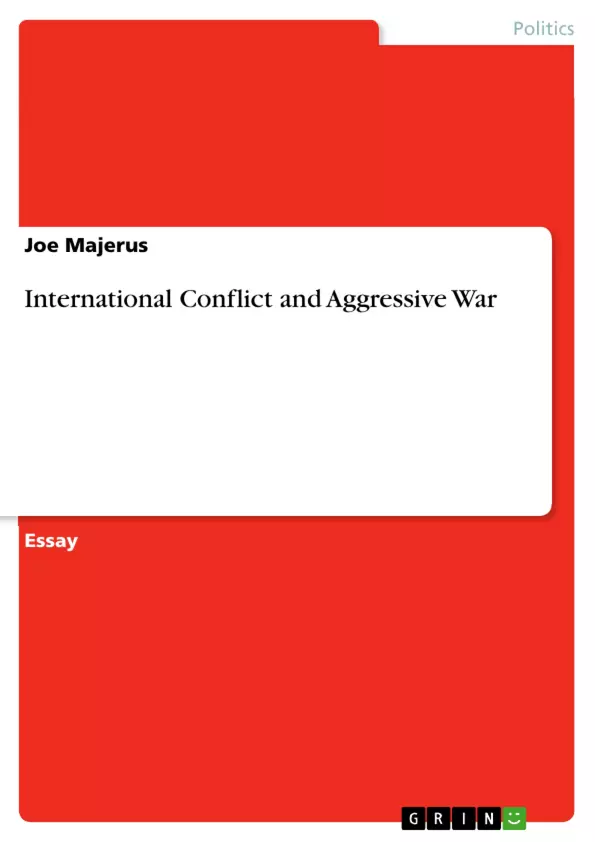The concept of universal peace cannot exist without the notion of international conflict. As with any other diametrically opposed reference systems—unipolar/multipolar, status-quo/revisionist, identity/alterity, etc.—it is arguably less the phenomeno-hermeneutical study of these two conditions as individual occurrences than the nexus and antithetical relationship which exists between them which ultimately provides the most interesting avenues for scholarly research into their various subcategories. Since the ideal of universal peace is central to this dissertation's underlying historical analysis, a thorough engagement with its natural opposite therefore deserves particular attention.
Two important qualifications, however, are in order: first, international war and conflict as here applied shall refer exclusively to wilful and aggressively pursued manifestations thereof, and thus not to the use of defensive war measures. While the latter designates the legitimate recourse to military force for the purpose of repelling an attack against the territorial integrity, political independence or interests of a political entity, its aggressive equivalent, on the other hand, represents the deliberate attempt of one unit to diminish or outright destroy the aforementioned, highly prized attributes of another. Secondly, it is important to remember that although a universal peace specifically implies the system-wide preponderance of both negative and positive peace elements, its possible termination, meanwhile, does not necessarily require the occurrence of universal war on a global scale—at least not initially. For even though the sudden outbreak of total systemic warfare would undoubtedly shatter world peace all by itself, its fragile composition might already become endangered by developments involving far less devastating and cataclysmic convulsions. History after all is rife with examples where the actual sources of transnational conflict are not just to be found in the eventual military clash of antagonists following a blatant breach of the peace by one of them.
Inhaltsverzeichnis (Table of Contents)
- International Conflict and Aggressive War
- Conceptualizations of War and Conflict
- Levels of Analysis
- Explanations of War
- The Causes of War
- Neo-Realism
- Neo-Liberalism
Zielsetzung und Themenschwerpunkte (Objectives and Key Themes)
This dissertation offers a comprehensive analysis of international conflict and aggressive war, exploring the historical context, theoretical frameworks, and underlying causes of interstate disputes. It examines the nature of both peace and conflict as diametrically opposed concepts and their intricate relationship within the international system.
- The definition and characteristics of international conflict and aggressive war.
- The relationship between universal peace and the emergence of conflict.
- The role of power and interests in driving interstate disputes.
- Different theoretical perspectives on the causes of war, including neo-realism and neo-liberalism.
- The significance of structural factors and systemic dynamics in explaining conflict.
Zusammenfassung der Kapitel (Chapter Summaries)
- The first chapter introduces the central concept of international conflict and aggressive war, exploring its historical and theoretical significance. It examines the interplay between peace and conflict, and how the pursuit of universal peace necessitates a thorough understanding of its opposite.
- Chapter 2 delves into various conceptualizations of war and conflict, examining their influence on international history. It explores the role of inter-state altercations, civil wars, and other forms of organized violence in shaping the international system.
- The third chapter introduces different levels of analysis in international relations, focusing on the structural, domestic, and individual levels. It explains how each level contributes to understanding the origins of interstate conflict.
- Chapter 4 examines various explanations of war, exploring the role of power, interests, ideology, and other factors in driving interstate disputes. It discusses the concept of power distributions and their impact on conflict.
- Chapter 5 focuses on the neo-realist school of thought, examining its key assumptions and arguments regarding the causes of war. It analyzes the importance of structural factors and the security dilemma in shaping interstate relations.
- Chapter 6 presents the neo-liberal perspective on conflict, highlighting its emphasis on cooperation, institutions, and democratic principles. It explores the role of economic interdependence, international organizations, and democratic values in preventing war.
Schlüsselwörter (Keywords)
The primary focus of this dissertation lies in the analysis of international conflict and aggressive war, exploring their historical contexts, theoretical frameworks, and underlying causes. Key concepts include universal peace, power distribution, security dilemma, neo-realism, neo-liberalism, democratic peace, and systemic dynamics.
Frequently Asked Questions
What is the difference between defensive and aggressive war?
Defensive war repels attacks on territorial integrity, while aggressive war is a deliberate attempt to destroy or diminish another entity's independence.
How is universal peace related to international conflict?
The concepts are diametrically opposed; studying one requires an understanding of the conditions that lead to its opposite.
What is the Neo-Realist perspective on war?
Neo-Realism focuses on structural factors, power distribution, and the security dilemma as primary causes of interstate conflict.
What does Neo-Liberalism emphasize in conflict prevention?
It emphasizes cooperation, international institutions, economic interdependence, and democratic principles to prevent war.
What are the "levels of analysis" in international relations?
The study examines conflict origins at three levels: the individual, the domestic (state), and the structural (systemic) level.
- Arbeit zitieren
- Joe Majerus (Autor:in), 2017, International Conflict and Aggressive War, München, GRIN Verlag, https://www.grin.com/document/432935



